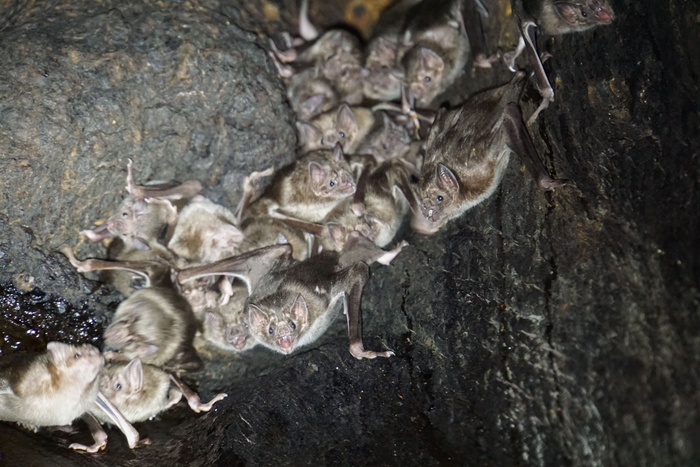During nightly foraging trips, female vampire bats preferentially meet up with roostmates they have a close social bond with, according to a report publishing September 23rd in the open-access journal PLOS Biology, by Simon Ripperger and Gerald Carter of The Ohio State University in the USA and the Smithsonian Tropical Research Institute in Panama. The study suggests that previously documented cooperation in this species also extends beyond the roost.

Credit: Simon Ripperger, CC BY 4.0 (https://creativecommons.org/licenses/by/4.0/)
During nightly foraging trips, female vampire bats preferentially meet up with roostmates they have a close social bond with, according to a report publishing September 23rd in the open-access journal PLOS Biology, by Simon Ripperger and Gerald Carter of The Ohio State University in the USA and the Smithsonian Tropical Research Institute in Panama. The study suggests that previously documented cooperation in this species also extends beyond the roost.
Vampire bats roost together in trees where they can be observed grooming each other and even sharing regurgitated blood meals with hungry roostmates. Previous research has shown this cooperative behavior is directed towards close relatives and social partners. To investigate whether the bats’ social bonds also influence their foraging behavior, researchers attached tiny proximity sensors to 50 female common vampire bats (Desmodus rotundus) – including 27 wild bats and 23 that had been captive for nearly 2 years – before releasing them back into their wild roost on a cattle pasture in Tolé, Panama.
The researchers found that although the tagged bats almost never left the roost together, closely bonded females often re-united far from the roost. Bats that associated with more partners in the roost also met up with more partners during foraging trips. Audio recordings of vampire bat calls in La Chorrera, Panama, revealed three distinct call types: ‘downward sweeping’ social calls, antagonistic ‘buzz’ calls, and ‘n-shaped’ feeding calls, the latter of which has not previously been observed in wild or captive vampire bats.
The authors hypothesize that the bats may meet up with trusted partners during foraging trips to share information about hosts or access to an open wound. They speculate that this collaboration might save on the time and effort involved in selecting and preparing a wound site on the cattle. The downward sweeping calls, which are similar to contact calls used to recognize partners in the roost, may also help the bats to identify friends and foes on the wing, they say.
The researchers add, “How far does ‘friendship’ go? We show that social bonds of vampire bats are not restricted to grooming and food sharing at the roost, but bonded individuals even hunt together, highlighting the complexity of their social relationships.”
###
In your coverage please use these URLs to provide access to the freely available articles in PLOS Biology: http://journals.plos.org/plosbiology/article?id=10.1371/journal.pbio.3001366
Citation: Ripperger SP, Carter GG (2021) Social foraging in vampire bats is predicted by long-term cooperative relationships. PLoS Biol 19(9): e3001366. https://doi.org/10.1371/journal.pbio.3001366
Funding: This study was funded by grants of the National Science Foundation (Integrative Organismal Systems #2015928; GGC; https://www.nsf.org/), of the Deutsche Forschungsgemeinschaft (https://www.dfg.de/) within the research unit FOR-1508, a Smithsonian Scholarly Studies Awards grant (GGC, SPR; https://www.si.edu/), and a National Geographic Society Research Grant WW-057R-17 (GGC; https://www.nationalgeographic.com/). The funders had no role in study design, data collection and analysis, decision to publish, or preparation of the manuscript.
Journal
PLoS Biology
DOI
10.1371/journal.pbio.3001366
Method of Research
Experimental study
Subject of Research
Animals
COI Statement
Competing interests: The authors have declared that no competing interests exist.




